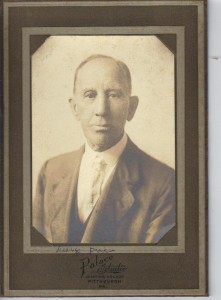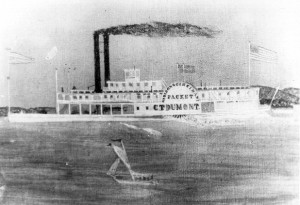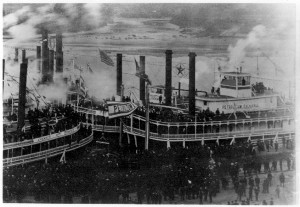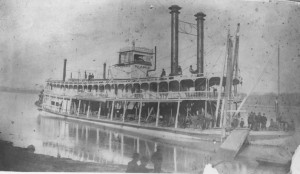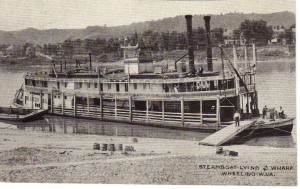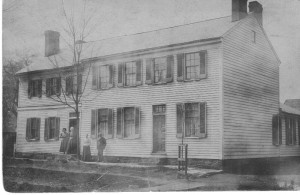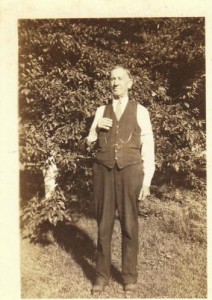Capt George WE Poe
George WE Poe, the son of Jacob Poe, was a second generation Poe steamboat pilot. He was born on May 12, 1844 during John Tyler’s presidency and in his lifetime saw twenty-three different administrations. He departed this life shy of 99 years on Feb 16, 1943 during the third term of Franklin D Roosevelt. In the fall of 1940 Capt Frederick Way Jr, the Ohio River historian, interviewed George WE Poe for the Waterways Journal. At that time George WE had been retired for more than 40 years. According to Capt Way, he acted “like a man of 60, clean shaven, sharp as a fox”.[1]
Much of his youth was spent on the river with his father. He worked as a clerk on various Poe steamers. During the Civil War, George WE Poe ran away from business school in Pittsburgh to join the war effort. His father “was down with the Union boats on the Tennessee River and they had me cooped up in a business school in Pittsburgh. I went down and got aboard the Minerva and come back to Georgetown.” [2]
At age nineteen while learning the river between Pittsburgh and Louisville, George was a cub pilot on the CT Dumont when she participated in the most exciting event in Parkersburg’s river history. The wharf at the mouth of the Little Kanawha River was filled with some 100 steamboats. All of them with steam up and destined for points all over the Mississippi system. The occasion was the return of the Union soldiers from the Civil War battlefields. The soldiers piled into Parkersburg on B&O trains, marched to the Ohio River, and boarded steamboats. The sidewheeler CT Dumont ferried two crammed loads to Lawrenceburg, IN .[3]
The CT Dumont had a notable history. Named for a noted engine and machine manufacturer in Cincinnati, the CT Dumont brought Gen Grant from Louisville to Cincinnati during the war; she conveyed US Grant, Mrs Grant and their four children form North Bend to Cincinnati on Sep 3, 1865, and she endured a tornado which destroyed her upper works in 1867. In 1874, she finally wore out and her machinery was transferred to the Pat Rodgers.
George WE Poe got his first pilot’s license in 1868. [4] He worked as a pilot on many boats including the Mollie Ebert, Messenger, and Scotia. He moved on to packets working between Pittsburgh and Wheeling and owned by Georgetown men. Living in Georgetown, he could get home quite often. The Glencoe was a sidewheel wooden hull packet built in Shousetown, PA in 1870 and completed in Pittsburgh in 1871. It was a big sidewheeler (275x43x7) built for deep water and operation in the Louisville to New Orleans trade. The original owners were Capt Thomas S Calhoon and Capt Jackman T Stockdale. The pilots who took her out for her maiden voyage were Jacob Poe and his son George WE Poe. The first clerk was John QA Parr. [5]
In the 1870s George WE Poe worked on the Abner O’Neal; the CW Batchelor in the 1880’s; and finally the HK Bedford in the 1890’s. In 1891, he quit the river excluding a few trips on the HK Bedford before she went into the Kanawha River trade.. At the time of his retirement the Davis Island Dam was the only lock and dam in the Ohio River.
The CW Batchelor was built for the Pittsburgh to Wheeling trade. George WE Poe was its pilot. When clerk Capt John A Edie died in 1890, Theodore C (Dory) Poe, brother of George WE, became the first clerk.
The HK Bedford was built by Howard in Jefferson, IN in 1885. Capt Gordon C Greene bought her in Jun 1890 for the Pittsburgh to Wheeling trade. George WE Poe was one of her pilots.
George WE Poe was a steamboat pilot with great credentials and great stories. His sunken barge tale was a favorite. To clear the main channel on the Ohio River near East Liverpool, OH, George WE Poe set off a skiff of nitroglycerin at the head of Line Island. There was a blinding flash of light and a deafening roar. Aboard the HK Bedford, doors and windows had been blown in; pictures and framed licenses fell from the pilot house wall. The blast broke windows in East Liverpool and knocked down chimneys in Hookstown some eight miles away he claimed with a laugh.[6]
George WE Poe lived in Georgetown his entire life and is buried in the Georgetown Cemetery. He retired on a pension in 1895 and lived his remaining days (48 years) in his father’s home, The Poe House, with his brother Charles Edgar and his brother’s daughter, Mrs Lillian May (Poe) Wagner. The original log house on the site was built by Thomas and Elizabeth Hephner Poe shortly after they moved to Georgetown in 1823. Thomas left the property to his son Jacob who built the original home. Jacob left The Poe House to his sons. Mrs Lillian Poe Wagner, George WE Poe’s niece, lived in the house until her death on 02 Jul 1971. For 148 years, the Poe family had lived continuously on the property.
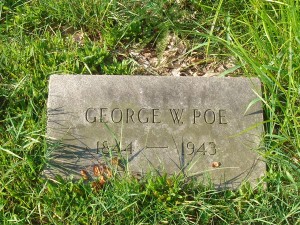
George WE Poe (F Nash Collection)
To the best of my knowledge, George WE Poe was never an owner or partner on any of steamers he worked.
If you live long enough, you turn into history. George WE Poe was born during the John Tyler’s presidency and in his lifetime he saw 23 different presidential administrations. He departed shy of 99 years during the third term of Franklin D Roosevelt. He lived the history of the rise and decline of the steamboat epoch.
[1] Capt Frederick Way, Jr., Over the Hills to Georgetown, (Waterways Journal) (St Louis, MO, (Nov 30, 1940)).
[2] Ibid.
[3] Ibid.
[4] Capt WC Dugan, The Passing of George Poe, (Waterways Journal) (St Louis, MO, (Mar 13, 1943)).
[5] Capt Frederick Way, Jr., The Steamboating Poe Family, (S&D Reflector (Dec 1965)).
[6]Alexander C McIntosh, Georgetown – Its Early Settlers and Their River Boat Experiences, Presentation to the Beaver County Genealogical Society, 5 Apr 1983.
Copyright © 2010 Francis W Nash
All Rights Reserved
No part of this website may be reproduced without permission in writing from the author.
